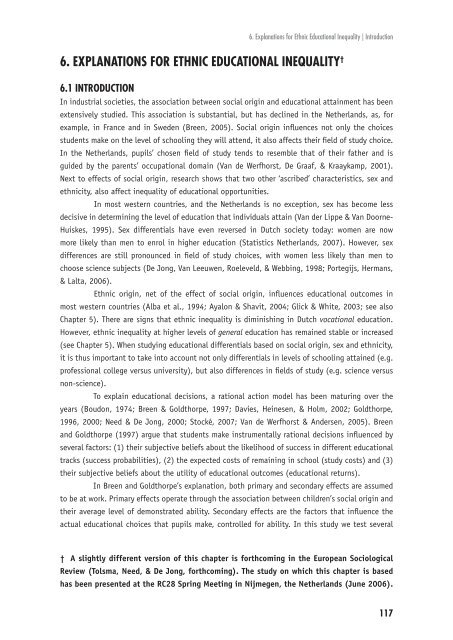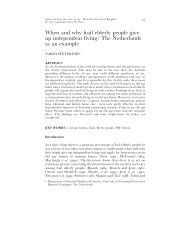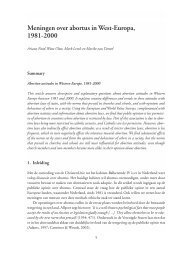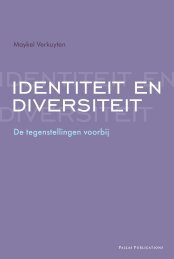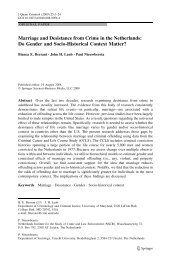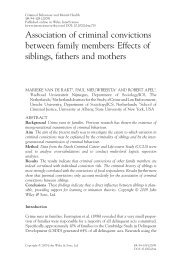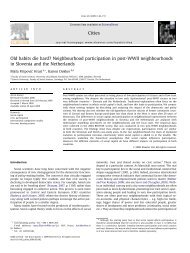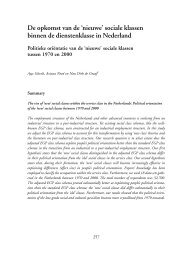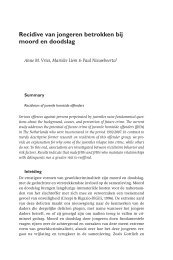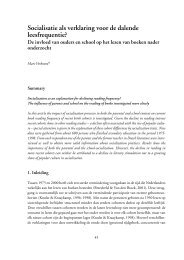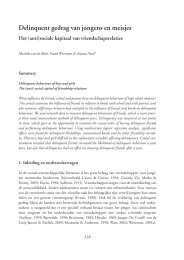Ethnic Hostility among Ethnic Majority and Minority Groups
Ethnic Hostility among Ethnic Majority and Minority Groups
Ethnic Hostility among Ethnic Majority and Minority Groups
Create successful ePaper yourself
Turn your PDF publications into a flip-book with our unique Google optimized e-Paper software.
6. EXPLANATIONS FOR ETHNIC EDUCATIONAL INEQUALITY †<br />
6.1 INTRODUCTION<br />
6. Explanations for <strong>Ethnic</strong> Educational Inequality | Introduction<br />
In industrial societies, the association between social origin <strong>and</strong> educational attainment has been<br />
extensively studied. This association is substantial, but has declined in the Netherl<strong>and</strong>s, as, for<br />
example, in France <strong>and</strong> in Sweden (Breen, 2005). Social origin infl uences not only the choices<br />
students make on the level of schooling they will attend, it also affects their fi eld of study choice.<br />
In the Netherl<strong>and</strong>s, pupils’ chosen fi eld of study tends to resemble that of their father <strong>and</strong> is<br />
guided by the parents’ occupational domain (Van de Werfhorst, De Graaf, & Kraaykamp, 2001).<br />
Next to effects of social origin, research shows that two other ‘ascribed’ characteristics, sex <strong>and</strong><br />
ethnicity, also affect inequality of educational opportunities.<br />
In most western countries, <strong>and</strong> the Netherl<strong>and</strong>s is no exception, sex has become less<br />
decisive in determining the level of education that individuals attain (Van der Lippe & Van Doorne-<br />
Huiskes, 1995). Sex differentials have even reversed in Dutch society today: women are now<br />
more likely than men to enrol in higher education (Statistics Netherl<strong>and</strong>s, 2007). However, sex<br />
differences are still pronounced in fi eld of study choices, with women less likely than men to<br />
choose science subjects (De Jong, Van Leeuwen, Roeleveld, & Webbing, 1998; Portegijs, Hermans,<br />
& Lalta, 2006).<br />
<strong>Ethnic</strong> origin, net of the effect of social origin, infl uences educational outcomes in<br />
most western countries (Alba et al., 1994; Ayalon & Shavit, 2004; Glick & White, 2003; see also<br />
Chapter 5). There are signs that ethnic inequality is diminishing in Dutch vocational education.<br />
However, ethnic inequality at higher levels of general education has remained stable or increased<br />
(see Chapter 5). When studying educational differentials based on social origin, sex <strong>and</strong> ethnicity,<br />
it is thus important to take into account not only differentials in levels of schooling attained (e.g.<br />
professional college versus university), but also differences in fi elds of study (e.g. science versus<br />
non-science).<br />
To explain educational decisions, a rational action model has been maturing over the<br />
years (Boudon, 1974; Breen & Goldthorpe, 1997; Davies, Heinesen, & Holm, 2002; Goldthorpe,<br />
1996, 2000; Need & De Jong, 2000; Stocké, 2007; Van de Werfhorst & Andersen, 2005). Breen<br />
<strong>and</strong> Goldthorpe (1997) argue that students make instrumentally rational decisions infl uenced by<br />
several factors: (1) their subjective beliefs about the likelihood of success in different educational<br />
tracks (success probabilities), (2) the expected costs of remaining in school (study costs) <strong>and</strong> (3)<br />
their subjective beliefs about the utility of educational outcomes (educational returns).<br />
In Breen <strong>and</strong> Goldthorpe’s explanation, both primary <strong>and</strong> secondary effects are assumed<br />
to be at work. Primary effects operate through the association between children’s social origin <strong>and</strong><br />
their average level of demonstrated ability. Secondary effects are the factors that infl uence the<br />
actual educational choices that pupils make, controlled for ability. In this study we test several<br />
† A slightly different version of this chapter is forthcoming in the European Sociological<br />
Review (Tolsma, Need, & De Jong, forthcoming). The study on which this chapter is based<br />
has been presented at the RC28 Spring Meeting in Nijmegen, the Netherl<strong>and</strong>s (June 2006).<br />
117


